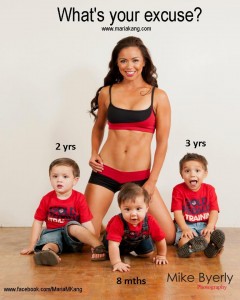 So last week, I came across a picture of freelance writer/fitness blogger Maria Kang wearing a sports bra, baring her abs, kneeling behind her three children and under the caption of “What’s Your Excuse?”
So last week, I came across a picture of freelance writer/fitness blogger Maria Kang wearing a sports bra, baring her abs, kneeling behind her three children and under the caption of “What’s Your Excuse?”
That picture got Maria way more attention than a she bargained for. Yahoo Shine reported that the photo went viral and racked up more than 16 million views on Facebook, with more than 12,000 comments. Some of the feedback is positive; but most of it isn’t. She’s been called a bully, an idiot, obnoxious, “desperate for fame” and out to shame fat women into “Maxim-established conformity”.
Most of the feedback just missed the point entirely. Some examples of the responses, from here and here:
“I can give you many ‘excuses’ to why a woman’s body does not snap back, or look like yours after having kids. Your comment is not only judgemental it’s biasly based on your own specific situation, body type, education, income, etc….”
“If you really cared to promote health you wouldn’t need to be half naked. You can show health by being dressed. The fact you chose attire such as this is that you were promoting appearance.”
Where are your kids while you’re spending all your free time working on you? …Put some clothes on and spend some time with your children.”
The Deep Assumptions In the Background
Sure, Maria’s tagline was a little douchey. And not everyone can get a body like hers (factors such as genetics play a part). But let’s put those aside for a moment.
I suspect that a large part of the anger comes from people who could improve their health and fitness if they wanted to. Instead of getting inspired, many of us sabotage ourselves by falling back to our assumptions.
See how many assumptions you can spot among the excuses. Here are two:
- “This only applies if you’re a fitness trainer or a stay-at-home mom with lots of time on her hands!”
- “I don’t need to turn into a spandex-wearing, half-naked hotshot who has no time for her kids! That’s demeaning!”
You can easily see the fallacy of the these assumptions. No one is asking you to copy Maria’s unique circumstances and become EXACTLY like her; The picture is meant to give most of us what we truly need: A kick in the ass to improve our health and fitness.
Assumptions Apply to Personal Capital
The same applies to increasing our personal capital. We’ll look at someone like Mark Zuckerberg and go, “Well he’s obviously successful, because he was born smart and went to Harvard.” or “I’d love to learn how to code, but I don’t wanna spend 60 hours a week staring at my computer.”
But the truth is, these are simply excuses to let us continue with the rest of our lives absolved of all responsibility of pursuing what we want. Did Harvard play a part in Zuckerberg’s success? Sure. Are they the only reasons for his success? Absolutely not. Years of hard work and deliberate practice helped him get to where he is.
If you wanted to pick up coding, does that mean that you have to turn into a hoodie-wearing, Coke-chugging nerd who stays up all night? Of course not. If all you want to do is perform well enough for your own purposes, that’ll probably only take about 20 hours of deep immersion. That’s all that stands between you and a new skill that could potentially make you rich.
It’s time to get honest with ourselves. As Maria wrote in her faux-apology to her haters,
“The first step in owning your life, your body and your destiny is to OWN the thoughts that come out of your own head. I didn’t create them. You created them.”
What are the Deep Assumptions holding you back?
[…] encountered some HUGE Invisible Assumptions while reading through the responses. Some readers talked about their dreams, and then ended off […]